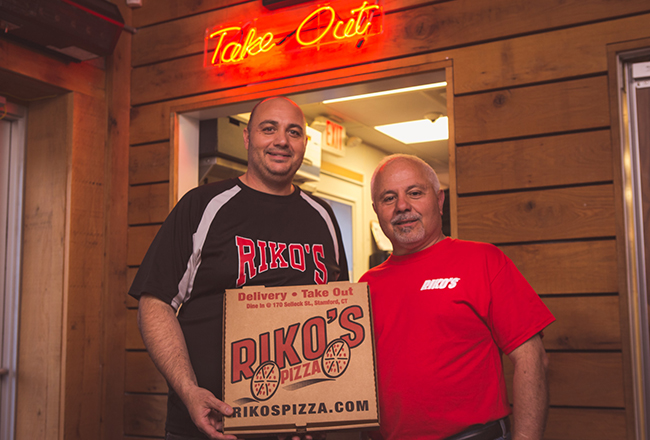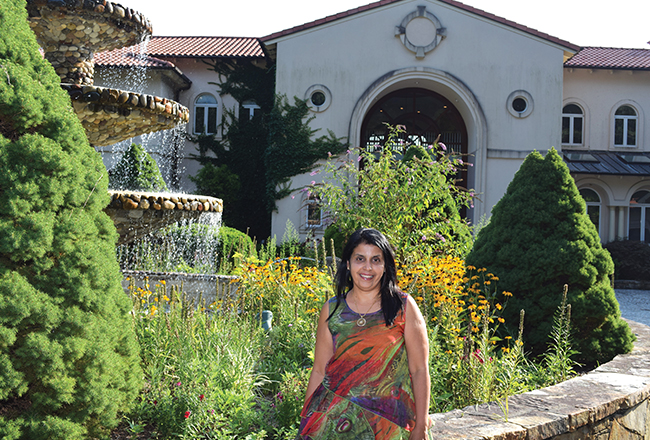
Since opening in 2011, Riko’s Thin Crust Pizza has established itself as one of the county’s most popular pizzerias.
So popular, in fact, that it’s looking to branch out nationwide.
“We have a great product and we want to get it to a lot more people,” said namesake Rico Imbrogno, who with his cousin Luigi Cardillo runs what is now a three-store operation: the original at 170 Selleck St. in Stamford; 886 Hope St. in Stamford, which opened in 2016; and 247 Connecticut Ave. in Norwalk, which opened earlier this year.
The idea to explore franchising dates back about five years, Imbrogno said. “We started the process about two years ago and finalized it three or four months ago.”
To that end they brought on franchise industry expert Gary Occhiogrosso, founder of Westwood, New Jersey-based Franchise Growth Solutions LLC, to expand the turnkey Riko’s casual quick service restaurant (QSR) business model to 15 locations by 2020. Franchises are now available in Connecticut, Rhode Island, New York and New Jersey, with further expansion along the eastern seaboard planned for the future.
“I’m not in the pizza business per se,” Occhiogrosso said. “But after I met with Rico and Luigi and tried their pizza, it blew me away. It’s really unique and the concept is the real differentiator.”
While delivery and takeout will be available, Riko’s franchises will be based on the casual dining model. “It’s a different direction,” Occhiogrosso said. “It’s focused on sit-down table service, with a full bar and is designed to present a relaxing, enjoyable environment instead of a rushed experience.”

Occhiogrosso said he was also impressed with Imbrogno and Cardillo’s decision to expand carefully.
“They spent a lot of time figuring out the right way to make a franchise grow,” he said. “A lot of people want to open a store and then start franchising six months later. They want a thousand stores in 10 years, real pie-in-the-sky stuff, and to do that they sell franchises to people who are not qualified.”
Instead, Imbrogno said, the plan is to carefully vet potential franchisees to ensure they share Riko’s “core values,” which include respecting employees and customers, are sufficiently capitalized and have demonstrated their personal involvement with their communities.
“We’ve been feeding local Little League and soccer teams from the start,” he said. “And if a drama club calls, we’ll feed them too ”” all on our own dime. We look at those kids as our potential future customers ”” if you can get them while they’re young, they’re going to stay with you.”
He and Cardillo first joined forces when Cardillo was still a contractor.
“I don’t have a real kitchen background. I’m not a chef,” Cardillo said. “I was renovating a building I had and (Imbrogno) came out and told me he’d rented a space and wanted to open a pizzeria. He was a little short on cash, but he made me a pizza and I said, ”˜You know what? I’ll be your partner.’ I thought even if it didn’t work out and we ended up renting it to someone else, I’d still have access to good pizza.”
Among Riko’s thin crust offerings is a hot-oil pizza, which involves infusing oil with crushed red pepper flakes that is added to the pie before baking; their twist is to place a whole pepper in the center of the pie after it is cooked to denote which pizzas have been made with the oil.
The owners of Stamford’s Colony Grill had threatened legal action maintaining that Riko’s essentially stole their hot-oil pizza recipe ”” a pair of former Colony employees helped start the Selleck Street operation ”” but Cardillo said that after Riko’s hired an attorney who found that the only copyright Colony had was for its name, the matter was dropped.
“We didn’t steal anything,” he said. “These are all our own recipes.”
The Riko’s duo is already meeting with prospective franchisees. “For years they’ve had people coming in and saying, ”˜Hey, if you ever decide to expand, give us a call,’” Occhiogrosso said. “We’ve had three or four face-to-face meetings with interested partners.”
Once accepted, franchisees must pay a $30,000 franchise fee, followed by a turnkey fee of $520,000 to $699,000, depending on the size and condition of the location. The turnkey fee includes the franchise fee, Cardillo said.
After that, Imbrogno and Cardillo will personally supervise a compulsory program involving 16 to 20 hours of classroom instruction and another 100 hours of on-the-job training at the Selleck Street store.
“We’ll be with (franchisees) every step of the way,” Cardillo said.
After that, Occhiogrosso said, “Once the franchisee demonstrates an understanding of the logistics, they can make it work for themselves. They can focus on building a business, not just making pizzas.”






















